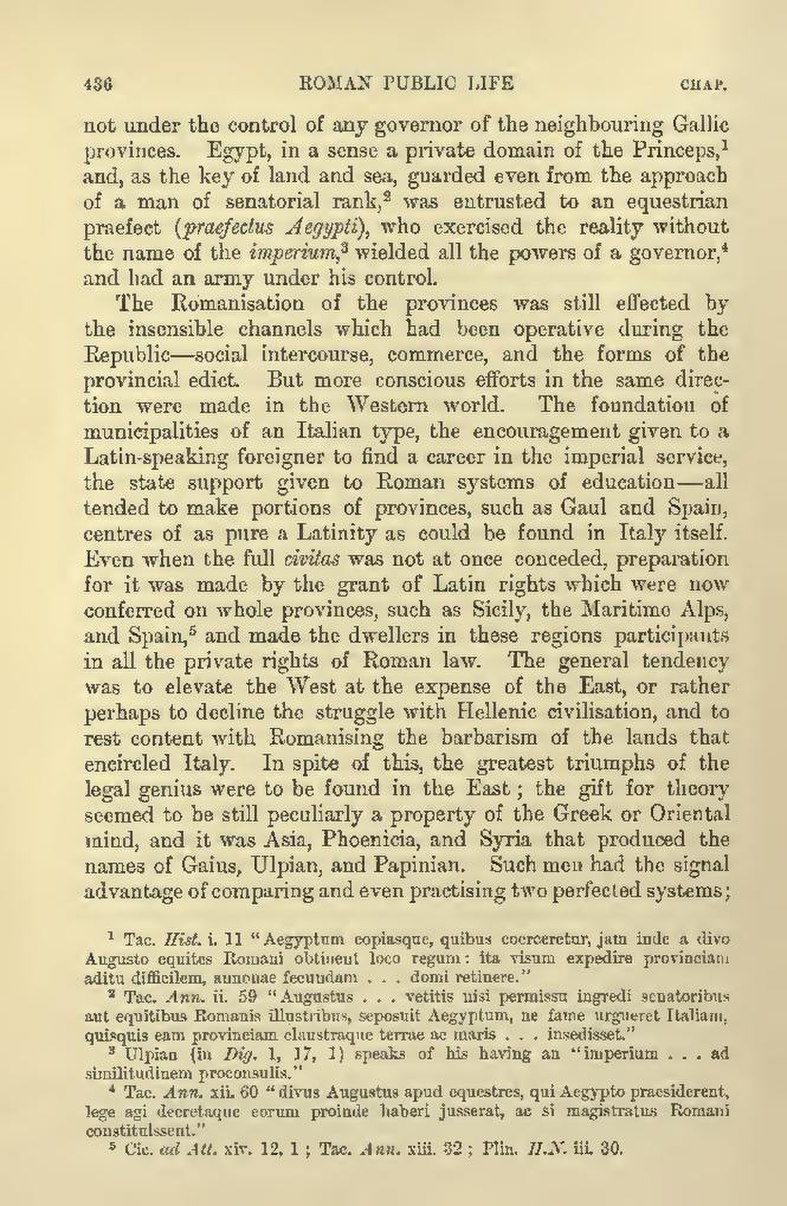not under the control of any governor of the neighbouring Gallic provinces. Egypt, in a sense a private domain of the Princeps,[1] and, as the key of land and sea, guarded even from the approach of a man of senatorial rank,[2] was entrusted to an equestrian praefect (praefectus Aegypti), who exercised the reality without the name of the imperium,[3] wielded all the powers of a governor,[4] and had an army under his control.
The Romanisation of the provinces was still effected by the insensible channels which had been operative during the Republic—social intercourse, commerce, and the forms of the provincial edict. But more conscious efforts in the same direction were made in the Western world. The foundation of municipalities of an Italian type, the encouragement given to a Latin-speaking foreigner to find a career in the imperial service, the state support given to Roman systems of education—all tended to make portions of provinces, such as Gaul and Spain, centres of as pure a Latinity as could be found in Italy itself. Even when the full civitas was not at once conceded, preparation for it was made by the grant of Latin rights which were now conferred on whole provinces, such as Sicily, the Maritime Alps, and Spain,[5] and made the dwellers in these regions participants in all the private rights of Roman law. The general tendency was to elevate the West at the expense of the East, or rather perhaps to decline the struggle with Hellenic civilisation, and to rest content with Romanising the barbarism of the lands that encircled Italy. In spite of this, the greatest triumphs of the legal genius were to be found in the East; the gift for theory seemed to be still peculiarly a property of the Greek or Oriental mind, and it was Asia, Phoenicia, and Syria that produced the names of Gaius, Ulpian, and Papinian. Such men had the signal advantage of comparing and even practising two perfected systems;
- ↑ Tac. Hist. i. 11 "Aegyptum copiasque, quibus coerceretur, jam inde a divo Augusto equites Romani obtinent loco regum: ita visum expedire provinciam aditu difficilem, annonae fecundam . . . domi retinere."
- ↑ Tac. Ann. ii. 59 "Augustus . . . vetitis nisi permissu ingredi senatoribus aut equitibus Romanis illustribus, seposuit Aegyptum, ne fame urgueret Italiam, quisquis eam provinciam claustraque terrae ac maris . . . insedisset."
- ↑ Ulpian (in Dig. 1, 17, 1) speaks of his having an "imperium . . . ad similitudinem proconsulis."
- ↑ Tac. Ann. xii. 60 "divus Augustus apud equestres, qui Aegypto praesiderent, lege agi decretaque eorum proinde haberi jusserat, ac si magistratus Romani constituissent."
- ↑ Cic. ad Att. xiv. 12, 1; Tac. Ann. xiii. 32; Plin. H.N. iii. 30.
